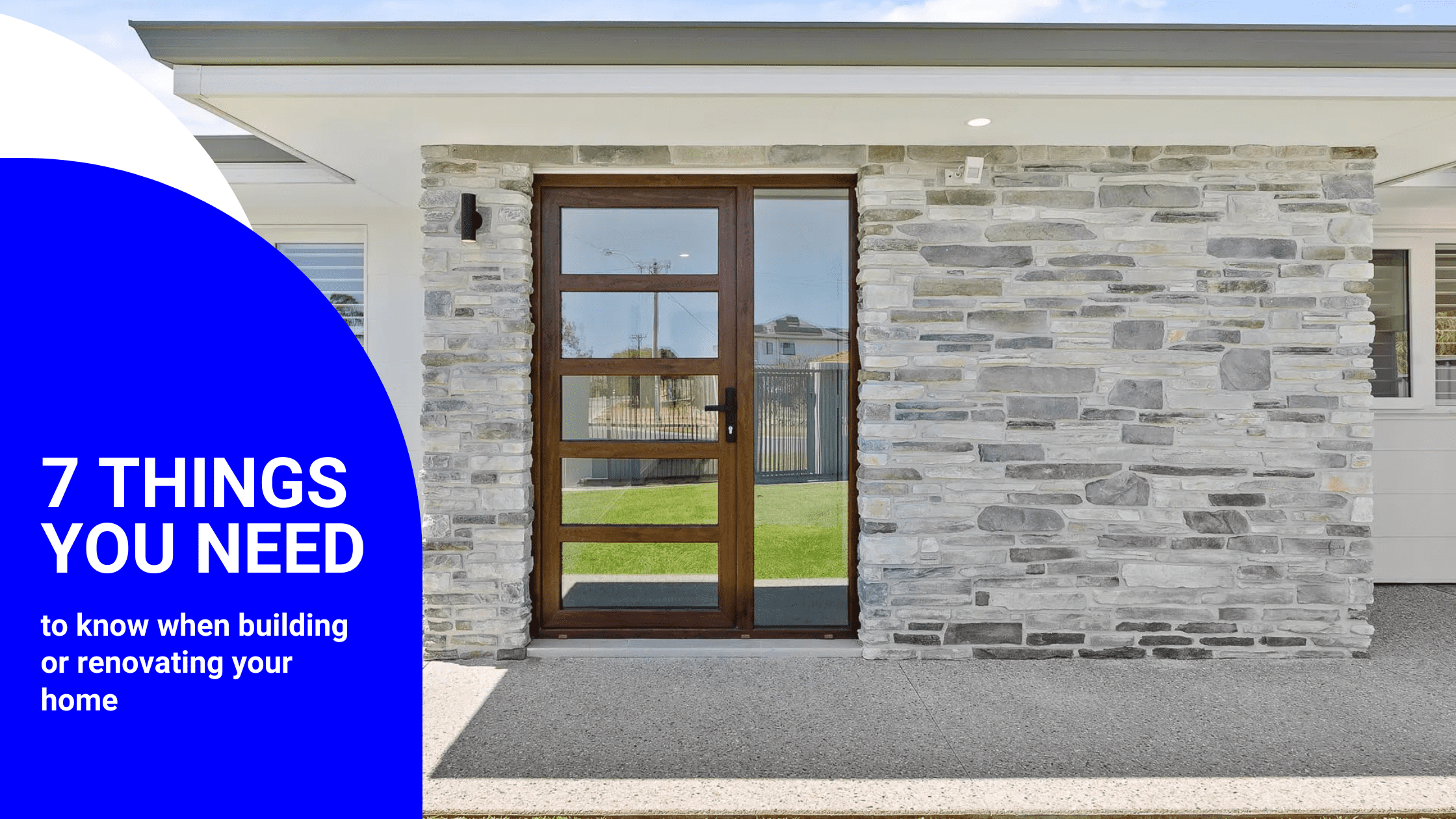7 things you need to know when building or renovating your home


Building your dream home from scratch – or renovating your existing property – is one of the most exciting projects you can embark on. However, we’ve all heard the horror stories of epic cost and time blowouts, botched jobs and dodgy builders.
In this blog, we cover the seven most important things you need to know before embarking on a custom home build or renovation project – take note of these and it’s almost certain that your project will run smoothly!
- It can be a rollercoaster of emotion
Embarking on a major project like a custom build or renovation can be emotionally fraught – especially if it’s your own home that’s being constructed or renovated. On one hand, you’re beyond thrilled about your new space. You may have dreamed about this for years, and it’s nearly time for it all to become real.On the other hand, these projects can be mind-numbingly terrifying. You’ve never done this before, there’s a huge amount of money on the line, and there are seemingly infinite decisions to be made – not least the selection of the professionals who will help you turn your vision into reality.
If possible, take the emotion out of your decisions – for example, imagine this is a project you’re overseeing for work. This can help remove the anxiety about the project – and help you make rational, dispassionate decisions.
- The right builder makes all the difference
Another way to take the heat out of your emotions is to get the right help – and chief amongst the people you need to hire is your builder.
Choosing a builder is like choosing a spouse – you need to make sure that you are the right fit to make sure that you have a fairy-tale ending. You need to put in the hard yards early: take the time to research builders before anything else to ensure you get a builder that you can trust, that will do an amazing quality job and that will give you an amazing experience along the way. Key steps include:
- Carry out online searches for builders that specialise in the type of building project that you need.
- Look at customer reviews on their website, Google or social media channels.
- Phone them up and arrange to meet these builders in person.
- Really question whether they have the skills you need.
- Ask the builder for testimonials and references from previous customers.
- Make sure that the builder that you meet with and have a connection with, is going to be the primary builder on your project site day to day.
- Above all, ensure your builder listens to you and seeks to understand your underlying issues – you may find the best solution is something you hadn’t considered!
- Not every builder is equal
Not all home builders are alike –some specialise in very different areas.
- Project builders build hundreds of homes a year from a variety of pre-designed plans. Typically, they provide standard floor plan designs, materials and fixtures and finishes for you to choose from. Their focus is primarily on volume and getting a house built fast.
- Custom builders carry out a small number of projects a year. As the name suggests, custom builders will tailor your home to your specific design requirements and needs, plot of land and lifestyle. Customers usually find they are more personable as they seek to understand your needs, wants and aspirations before building.
- Renovation & extension builders are a highly versatile type of builder. Renovation is often more complex than building a new home from scratch due to hidden, underlying issues. These builders usually engage more with customers than any other builder, not least due to some customers living on site while the renovation and extension is being carried out.
When researching builders, ensure you’re looking at the right type of builder. If you’re planning to do a major renovation, extension or a custom build, it’s critical to choose a builder who is specialised in these areas to get the best result.
- Make sure your builder is 100% above board
One of the most important ways to ensure you don’t get scammed by a dodgy builder is to ensure that they tick all the boxes when it comes to running their business properly. Critical elements include:
- The proper licences: ensure the builder is registered, licensed and legally permitted to be involved in building and construction. You can check the builder’s registration through your relevant state authority.
- Proper insurances: at a bare minimum, a builder should have public liability insurance, worker’s compensation and home indemnity insurance (also known as home warranty insurance, home building compensation or domestic building insurance). Ask for a copy of their insurance certificates.
- It’s important to establish expectations upfront
The key to a good builder-client relationship is establishing expectations from the initial meeting. You must communicate expectations that you have of the builder; equally the builder must communicate their expectations of you. Expectations you should have of the builder might include the following:
- The builder must communicate frequently using an agreed communication style; the communication must be maintained throughout the project.
- The builder must keep you updated on the schedule and updates on the project.
- The builder must project manage the entire job as this is what they have trained to do in their profession. It is not up to you to manage any of the building works.
Expectations the builder may have of you:
- You must be quick to respond to selections and any other decisions about your home build.
- You must communicate with the builder if you have any worries or concerns, or if the builder has done something wrong, so that the builder can respond appropriately and rectify any issues.
- A comprehensive detailed proposal can help avoid budget blowouts
With your money on the line – and most likely a substantial amount of it – avoiding cost overruns is always a key priority. Therefore, doing the work early on to nail down the budget is critical. Your builder should provide you with a comprehensive, clear, understandable proposal that has as many items as possible included. This should be highly detailed and not full of builders’ jargon that looks like gobbledygook to you, nor should it be chock-full of inclusions and exclusions.
You may wish to pay your builder for this proposal, as that way you can be more certain that the builder has taken their time to get it right, as opposed to dashing it off in between jobs.
It’s also essential to ensure that you have a contingency fund to accommodate any unexpected changes (such as sudden increases in material costs, alternative fixtures and fittings if there are stock issues with your chosen options, or additions/upgrades to the project).
- Don’t skimp on the legals
One of the most important pieces of paper regarding your project is the contract you’ll sign with the builder. Most builders use home building contract templates from industry associations like Master Builders Australia or the Housing Industry Association (HIA). A well-crafted contract includes the following things to ensure potential future disputes are avoided:- The description of the works is clear
- The inclusions and exclusions list is clear
- The agreed contract price is inclusive, reasonable and clear
- The process for resolving disputes should they arise is clear
- The key construction stages and review process is clear
- The milestone payment dates are clear
A clear, detailed contract ensures protection for you and your builder. Get legal advice if you need to ensure the contract is fair and impartial, as even small changes to contracts can cause large headaches down the line. If you don’t have a contract and something goes wrong during the course of your build, then you have no right to recourse and you are left in a very vulnerable position.
Conclusion: “He who fails to plan…”
“…is planning to fail.”
You may have noticed something about all of the above points – none of them relate to the actual construction phase of your project (whether it’s a custom house build or a renovation). That’s because, if you put the proper work in before the building works start – ensuring you’ve partnered with the right builder, protected yourself legally, firmed up a solid budget and satisfied yourself that all the boxes are ticked – the actual construction should be relatively stress-free. And, you’ll get the dream home or renovation that you envisaged, on time and on budget.
Perway Construction Services is Perth’s most recommended and experienced custom home, renovation and extension builder. We’re here to help you navigate the building process and ensure your project is completed just as you envisage it. To experience Perway quality, get in touch today.


